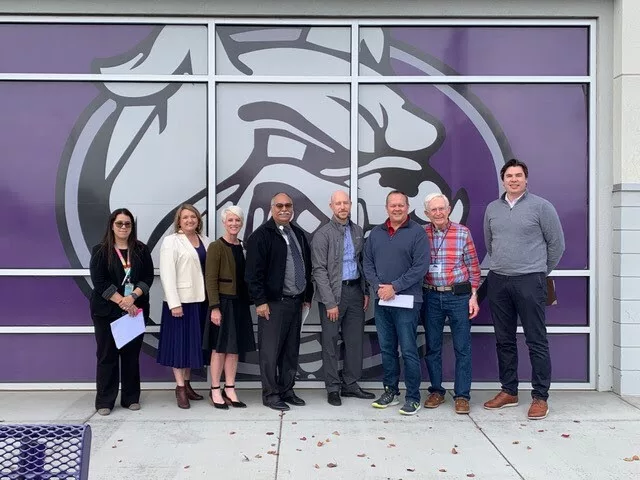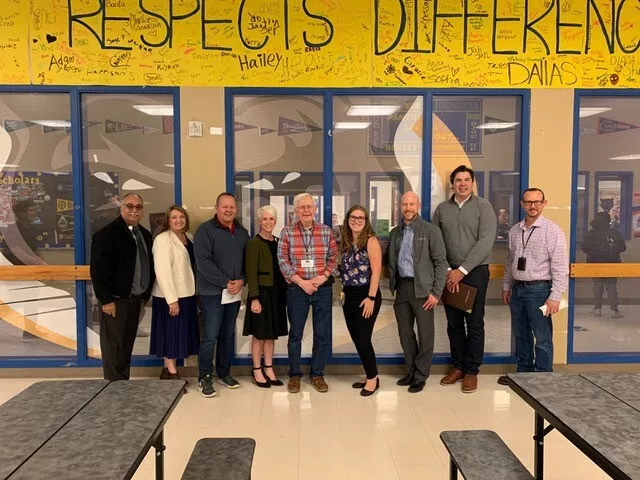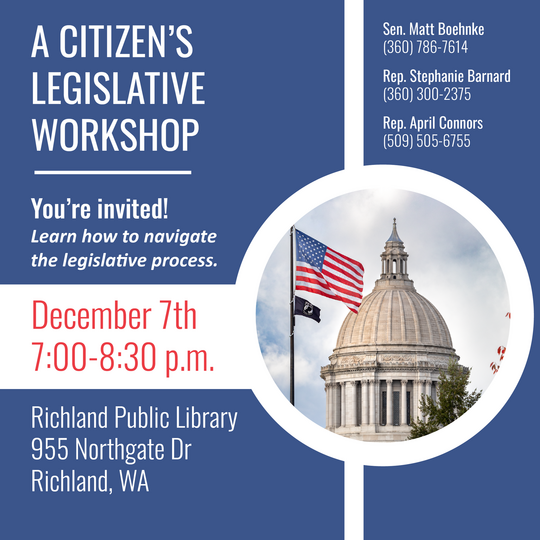
Nov. 30, 2023 | Volume I, Issue 6
A Citizen’s Legislative Workshop
Dear Friends and Neighbors,
I would like to invite you to a Citizen’s Legislative Workshop on Dec. 7 from 7 to 8:30 p.m. at the Richland Public Library, located at 955 Northgate Dr., Richland, WA.
Join me and Washington State 8th District Representatives Stephanie Barnard and April Connors to learn to how to navigate the legislative process.
I feel that empowering our community through active participation and engagement is the cornerstone of a thriving democracy. At the Dec. 7 legislative workshop, we will focus on breaking down barriers and opening pathways for every constituent in the 8th Legislative District to have their voice heard. Together, we can enhance our collective understanding, encourage meaningful involvement, and ensure that every vote is not just counted, but also counts towards shaping a brighter, more inclusive future for us all.
I look forward to seeing you Dec. 7.
Click here for more information on how to attend.
Sincerely,

Sen. Matt Boehnke
R-Kennewick
Boehnke embarks on Pasco School Dist. legislative school tour

On October 23, 2023, Washington State Senator Matt Boehnke (R-Kennewick) embarked on an enriching visit to the Pasco School District, marking a key stop on a legislative school tour facilitated by the Washington Association of Maintenance and Operation Administrators (WAMOA).
The focal point of this insightful tour was Pasco High School, an institution with a rich history dating back to its establishment in 1952. Over the years, Pasco High School has undergone transformative modernizations, notably expanding crucial areas such as the library, science facilities, and English classrooms.
One noteworthy addition to the school is a transitional chemistry class tailored for English Language Learners, showcasing a commitment to inclusive education. The student mall has also undergone a remarkable expansion, providing a picturesque setting for students to enjoy their breakfast and lunch.
Adjacent to the mall stands the PHS Credit Union, a unique establishment staffed by certified educators and credit union professionals. This innovative initiative, founded in the 1980s, stands as the first high school credit union in the region, enabling students to manage their finances and engage in activities such as car loans.
The legislative delegation extended their visit beyond Pasco High School, encompassing Livingston Elementary and Stevens Middle School. The Booth Education Service Center served as a platform for a presentation on Markham Elementary School and McGee Elementary Schools, rounding out a comprehensive overview of the educational landscape.
WAMOA legislative tour visits McLoughlin Middle School

During the legislative school tour, Sen. Boehnke also visited McLoughlin Middle School, home to 1,100 students in grades 6-8. Despite its origins dating back to 1983, the school is slated for renovation in a 2027 bond issue, attesting to the district’s dedication to modernization. The local tax rates, with the EPO levy at $1.78 per $1,000 assessed valuation and the bond at $1.60 per $1,000 of assessed valuation, reflect the community’s investment in education.
Emphasizing the paramount importance of school safety, the legislative group witnessed firsthand the excellent school climate prevalent in all the visited institutions. Both the high school and middle school boast security measures such as vestibules at their main entrances, comprehensive camera systems, and the presence of a full-time School Resource Officer, all contributing to effective student safety.
McLoughlin Middle School, in particular, stands out for its expansive wood shop and the provision of vocational courses in the STEM lab and Family and Consumer Science program. The school’s spacious gym facilitates multiple physical education activities simultaneously, and the large cafeteria accommodates breakfast and three school lunch periods. Looking ahead, the district envisions further growth, with plans in the 2027 bond to expand the school site by approximately 112,000 square feet on available land.
Boehnke visits Stevens Middle School
On Oct. 30, 2023, Sen. Boehnke visited Ms. Bobiles class at Stevens Middle School in Pasco. He was there to talk about introducing and bringing forward the Blueberry Bill this next 2024 session. The Blueberry Bill was drafted this past session 2023, but was too late to get a hearing when it was brought to his attention.
Ms. Bobiles sent Sen. Boehnke a letter last session about making the blueberry the State Berry. This letter led to the drafting of SB 5762, which was sent to the State Government Committee, but was too late to get a hearing in 2023. Sen. Boehnke expects the bill to gain more traction during the next legislative session.
My Opinion | Tri City Herald | Oct. 1, 2023
We can’t hide from COVID learning loss. Republicans want to face it head-on
Less than a month into the new school year, students, parents, and teachers clearly are still dealing with the ramifications of pandemic policies that closed in-person classrooms and caused significant learning loss among Washington students.
For lawmakers, the learning-loss issue goes beyond a critical challenge. It represents a moral imperative that cannot and should not be ignored.
The recent release of two studies painted drastically different pictures of the situation.
On Sept. 8, the Office of Superintendent of Public Instruction (OSPI) released data from the 2023 state assessment. The agency’s spin on learning-loss recovery is rosy. It claims students have recovered in math in “nearly all grades,” with the case being similar for elementary students in English language arts.
The report does contain a significant caveat, warning that “engagement, attendance, grades, and classroom-based assignments and tests provide more detailed, timely, and useful information about individual students’ progress to their families and educators.”
A more helpful analysis comes from a report entitled “Student Achievement and the Pandemic: Analysis of Test Scores, Earnings, and Recovery Interventions,” published this month by the Washington State Institute for Public Policy – an Olympia-based public-research group created by the Legislature, with a bipartisan board.
WSIPP analyzed how student math and English language arts achievement changed during the COVID-19 pandemic and found average math and ELA test scores were lower in 2022 than average scores before the pandemic. Math scores plummeted even more. The most shocking decline occurred in middle-school grades and among female students, students of color, and low-income students.
This level of learning loss is projected to equal a $32,000 decrease in future earnings per student – an even more significant blow to those who can least afford another obstacle to success.
The WSIPP report points to a system still in flux, where harm from learning loss is still being felt profoundly and in a way that disproportionately affects some students.
As a lawmaker, it is my job to listen, then look for common-sense solutions. I am especially focused on education, as it is vital to the economic well-being of our state and also designated by Washington’s constitution as state government’s paramount duty.
Continued attempts by Superintendent of Public Instruction Chris Reykdal to minimize the damage done to our children during the pandemic are alarming and tone-deaf. Parents have every right to expect our state’s policymakers and education leaders to take this issue seriously and help students recover.
So what can we do? The WSIPP study recommends immediate steps to address this learning loss, primarily by increasing the availability of tutoring, summer-school programs, and “double-dose” classes, in which students struggling to reach academic standards attend two class periods in a subject matter, instead of one.
This approach is in line with that of Senate Republicans. Throughout the 2023 legislative session, Republicans pushed to devote state and federal funds to address learning loss through intense, focused tutoring and rigorous extended-learning programs. We advocated for creating Student Academic Achievement Grants to target learning loss, with funds for tutoring and comprehensive learning programs. We also suggested extending the school year by five days to provide additional in-class instructional time.
Unfortunately, the Democrat majority failed to act on Senate Bill 5248, sponsored by Senate Republican leader John Braun, which would have implemented these ideas. It also turned down his measure (SB 5511) to put more funding toward increasing education equity and learning recovery among all Washington students, regardless of race or ZIP code.
When we return to Olympia in January, I will introduce legislation to increase tutoring opportunities, instruction time, workforce development, and apprenticeship opportunities, as well as reduce barriers for low-income and minority communities.
It’s a mistake to sugarcoat the situation like OSPI is. Or refuse to act, like the Democrat majority has. Without a comprehensive approach to addressing this learning loss crisis, our children will be failed a second time. They deserve better.
Sen. Matt Boehnke represents the 8th Legislative District and is lead professor of the cybersecurity division at Columbia Basin College.
In the news | Seattle Times | Oct. 17, 2023
Hydrogen is the next green thing for WA
The Biden administration recently announced funding for seven hydrogen production hubs across the country. One of them is in the Pacific Northwest. Washington, Oregon and Montana will receive up to $1 billion for eight hydrogen projects, half of them in Washington.
On Oct. 17, the Seattle Times Editorial Board wrote an editorial on the growing green energy sector – hydrogen. Read the editorial here.

Cultivate Washington launches
Washington State Senate Republicans released a pro-agriculture agenda on Nov. 14 for the 2024 legislative session. The agenda will address overregulation, farm closures, water rights, and other issues that threaten Washington’s agricultural industry, the heritage of rural communities and the food supply.
“Cultivate Washington” was introduced by Sen. Ron Muzzall, R-Whidbey Island, Sen. Judy Warnick, R-Moses Lake, Sen. Perry Dozier, R-Waitsburg, and Sen. Shelly Short, R-Addy.
Each sponsor of the agenda is either a farmer or is personally entrenched in the agriculture community, providing lifelong firsthand experience and knowledge lacked by some decision makers. As the legislative session approaches, the Senators and their colleagues will draft legislation to satisfy the priorities of “Cultivate Washington.”
These priorities include:
- Reducing the regulatory burden on farming operations while balancing the interests of farmworkers
- Ease the pain of high fuel costs
- Promote new opportunities for the state to support small- and mid-sized farms
- Continue work toward a reliable supply of water for crops and farm housing
- Seek a balance between the needs of wildlife and the needs of farming operations
- Work toward a renewed public appreciation for agriculture



